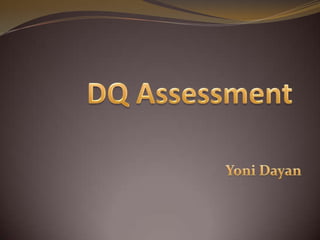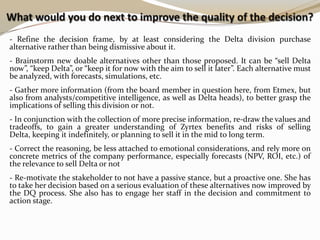DQ Assessment
- 2. - Purpose: Chris intends to know whether or not she sells the Delta division to Etmex. - Scope: the boundary for the situation is primarily the Delta division. - Perspective: the context of the decision is comprised of Chris as CEO, Steve as CFO, the key people from the Delta division, and the board. - General note: Chrisâs frame is flawed with emotional bias (attachment to Delta), comfort zone stigmata (satisfied with the current situation and not really considering this proposal), as well as a too instinctive and borderline individualistic approach (her first thought-out decision is the one she wants to defend to the board, without properly studying the alternative and acknowledging other stakeholder views).
- 3. From the perspective of a board member overhearing the conversation between Chris and Steve, he/she wouldnât view Chrisâ current recommendations favorably in regard to the six elements of DQ. - Appropriate Frame: 50% Rather clear purpose (whether or not selling Delta division of Zyrtex), but flawed scope and perspective, Chris is too centered on Delta and not on the impact on Gamma, Etmex proposal, and she isnât taking into account othersâ insight. - Creative, Doable Alternatives: 30% Chris is more or less dismissing the Delta division purchase alternative from the start, and isnât generating other âmiddle groundâ options between this, and keeping Delta: splitting of the Delta division in fewer entities from which one could be sold; the planned consolidation of ZyrTex activities in the months/year to come to sell Delta once the Gamma division and the overall core assets of the company are secure, etc. - Meaningful, Reliable Information 30% The usefulness of the information available is limited as a result of its vagueness. We donât know how much Etmex want to buy Delta, we donât know what kind of relationships (partnership? licensing? etc.) may link the newly independent Delta as a company, and Zyrtex (then constituted of Gamma), and other important points.
- 4. - Clear Values and Tradeoffs: 50% Rather clear values and tradeoffs for the overall discussion between Chris and Steve, but lackluster if we focus on what Chris is saying. The alternative âsell Delta for increased cash flow for Zyrtex + greater pay-off and short-time satisfaction of the shareholders + possible re-focus on a more narrowed business through Gamma and its innovative/new market approachâ is expressed by Steve, not her. The other alternative âkeep Delta as a reliable source of income in addition to an already healthy financial situation, which will preserve key human resource that proved efficient in this division and help in the mid to long term for Gamma developmentâ is representing her comfort zone and she nearly already made up her mind in favor of it. She is failing to contemplate the stakeholder view, and even suspect that itâs competitive intelligence rather than an opportunity. - Logically Correct Reasoning: 30% Chris seems to rely heavily on instinct and emotional bias, such as her attachment to Delta, the fact that she started there, that she promoted Cindy as division head just recently, and that she âlikes the management over thereâ. A shareholder overhearing this could say âthatâs good for her, but what about us and the performance of the company overall?â. Key considerations such as the value and implications of this hypothetic selling of Delta, or its ties to Zyrtex once itâs done arenât addressed. - Commitment to Action: 30% Chris adopts a passive stance, she will ÂŦ try to convince to pass on this Âŧ potential acquisition, rather than either being committed to sell Delta, or strategically further reinforce its place amongst Zyrtex for potentially more advantageous acquisitions later. Moreover, she isnât engaging the other stakeholders (board, members of Delta, key people from Etmex) behind her decision process.
- 5. - Refine the decision frame, by at least considering the Delta division purchase alternative rather than being dismissive about it. - Brainstorm new doable alternatives other than those proposed. It can be âsell Delta nowâ, âkeep Deltaâ, or âkeep it for now with the aim to sell it laterâ. Each alternative must be analyzed, with forecasts, simulations, etc. - Gather more information (from the board member in question here, from Etmex, but also from analysts/competitive intelligence, as well as Delta heads), to better grasp the implications of selling this division or not. - In conjunction with the collection of more precise information, re-draw the values and tradeoffs, to gain a greater understanding of Zyrtex benefits and risks of selling Delta, keeping it indefinitely, or planning to sell it in the mid to long term. - Correct the reasoning, be less attached to emotional considerations, and rely more on concrete metrics of the company performance, especially forecasts (NPV, ROI, etc.) of the relevance to sell Delta or not - Re-motivate the stakeholder to not have a passive stance, but a proactive one. She has to take her decision based on a serious evaluation of these alternatives now improved by the DQ process. She also has to engage her staff in the decision and commitment to action stage.





